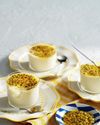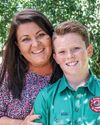
In 1970 Trudy McCullagh’s son, Darren, was born frighteningly premature, a full three months before his due date. Little Darren was strong, however, and in time the doctors told Trudy the pair would be able to make the journey home. But there had been complications. “Before I could take him home from the hospital, we were given the news,” she says. Darren was going blind.
“Since then, I’ve been able to say, if only he was only blind,” Trudy adds because that diagnosis was just the beginning.
Photos from Darren’s early years in the 1970s show a sweet little boy, with blond hair like his mother, but Trudy became concerned when she started to notice changes in his behaviour. He was around two years old when she realised his needs may be more complex than she first thought. Her little man was easily distressed. He would scream for no apparent reason, and Trudy didn’t know how to calm him down.
“The telephone would ring, and he’d scream for two hours. Even if I went and touched him because I wanted to show him his toys, he’d scream. Not cry, scream,” Trudy says. It wasn’t until he was four that he was diagnosed with autism, and as she sought to find support, Trudy felt deeply alone.
“It was heartbreaking. The early years were extremely difficult. I had no family here in Australia. Nobody could advise me where to go, who to see,” she says.
The Royal Institute for Deaf and Blind Children at Carlingford, in Sydney, cared for Darren during his childhood, but he would often scream most of the day.
Esta historia es de la edición Christmas 2021 de The Australian Women's Weekly.
Comience su prueba gratuita de Magzter GOLD de 7 días para acceder a miles de historias premium seleccionadas y a más de 9,000 revistas y periódicos.
Ya eres suscriptor ? Conectar
Esta historia es de la edición Christmas 2021 de The Australian Women's Weekly.
Comience su prueba gratuita de Magzter GOLD de 7 días para acceder a miles de historias premium seleccionadas y a más de 9,000 revistas y periódicos.
Ya eres suscriptor? Conectar

Maggie's kitchen
Maggie Beer's delicious veg patties - perfect for lunch, dinner or a snack - plus a simple nostalgic pudding with fresh passionfruit.

Reclaim your brain
Attention span short? Thoughts foggy? Memory full of gaps? Brigid Moss investigates the latest ways to sharpen your thinking.

The girls from Oz
Melbourne music teacher Judith Curphey challenged the patriarchy when she started Australia's first all-girls choir. Forty years later that bold vision has 6500 members, life-changing programs and a new branch of the sisterhood in Singapore.

One kid can change the world
In 2018, 10-year-old Jack Berne started A Fiver for a Farmer to raise funds for drought relief. He and mum Prue share what happened next.

AFTER THE WAVE
Twenty years ago, the Boxing Day tsunami tore across the Indian Ocean, shredding towns, villages and holiday resorts, and killing hundreds of thousands of people from Indonesia to Africa. Three Australians share their memories of terror, loss and survival with The Weekly.

PATRICIA KARVELAS How childhood tragedy shaped me
Patricia Karvelas hustled hard to chase her dreams, but it wasn't easy. In a deeply personal interview, the ABC host talks about family loss, finding love, battles fought and motherhood.

Ripe for the picking
Buy a kilo or two of fresh Australian apricots because they're at their peak sweetness now and take inspiration from our lush recipe ideas that showcase this divine stone fruit.

Your stars for 2025
The Weekly’s astrologer, Lilith Rocha, reveals what’s in store for your astrological sign in 2025. For your monthly horoscope, turn to page 192.

MEL SCHILLING Cancer made me look at myself differently'
One year on from going public with her bowel cancer diagnosis, Mel Schilling reveals where she's at with her health journey and how it's changed her irrevocably.

Nothing like this Dame Judi
A few weeks before her 90th birthday, the acting legend jumped on a phone call with The Weekly to talk about her extraordinary life – and what’s still to come.